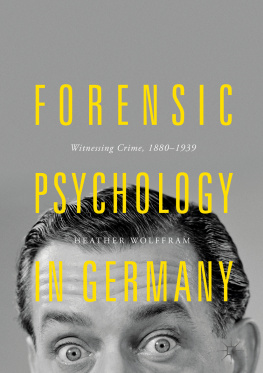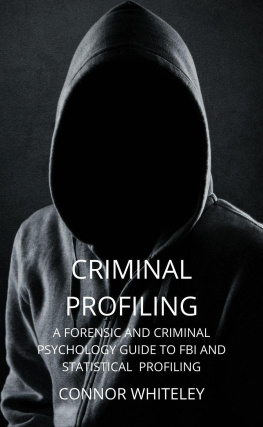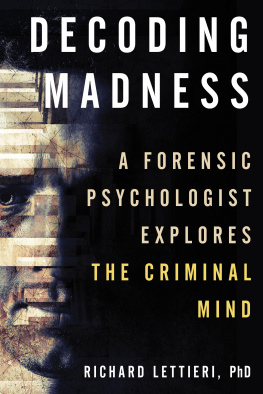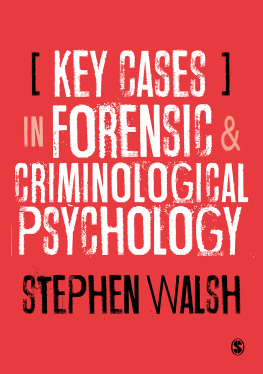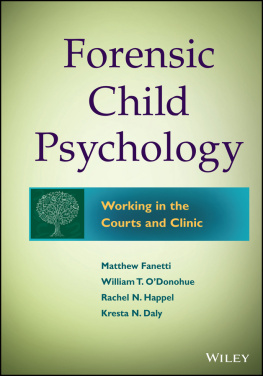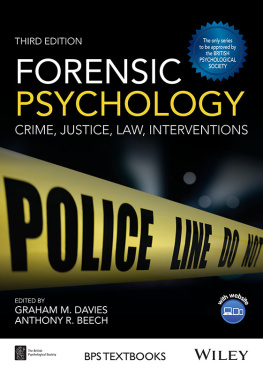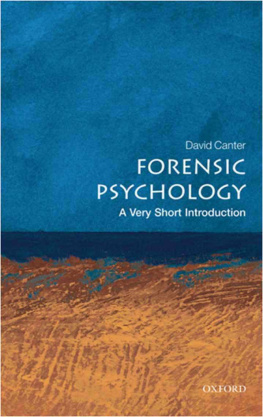1. Introduction: Witnessing Crime
Writing in 1900 in the Wiener Zeitung ( Viennese Newspaper ), Hans Gross (18471915), an Investigating Judge, Professor of Criminal Law at Czernowitz and editor of the Leipzig-based journal Archiv fr Kriminal-Anthropologie und Kriminalistik ( Archive for Criminal Anthropology and Criminalistics ), complained of the narrow contemporary use of the term criminal psychology.
While Gross sought to remobilise the term criminal psychology, in order to describe this new field, the discipline he envisaged in the pages of the Wiener Zeitung was to become more commonly known as forensic psychology. Dedicated to the psychology of all those involved in criminal proceedings, this new science promised to move away from an exclusive focus on the criminal to provide a holistic view of how human fallibility impacted upon criminal justice . While in Germany during the following decades a number of psychiatrists, psychologists and jurists took steps to realise Gross vision, by the inter-war period, it was apparent that, to a large extent, concentration on the criminal had simply given way to an equally narrow focus on the witness, particularly the juvenile witness . Writing in 1927, for example, the psychologist Paul Plaut (18941960) noted,
the big questions, that for twenty years have occupied psychologists, centre nearly exclusively on the problems of the psychology of testimony. They got hold of the narrowest area of forensic psychology, in that, they specialised in the psychology of the witness and, also here, only again on a quite small, if not unimportant part, namely the psychology of childrens and juveniles testimony.
Similarly, in the same year, the district court judge, Albert Hellwig (18801950) complained,
From the wide purview of forensic psychology is covered, nearly exclusively, the area of the psychology of the testimony of the witness, only slightly the psychology of the accused and as good as nothing on the very important psychology of interrogators, particularly of police officials and judges.
While there were attempts, mainly on the part of jurists, to conduct investigations of the psychology of the judge and the jury and to develop a reliable psychological test to detect offenders lies, the psychological problems that arose from German criminal trials in the Imperial and inter-war periods acted far more as a stimulus for research on the witness than on any other participant in criminal proceedings. Figures like Plaut and Hellwig may have resisted this tendency, but it was the question of the credibility of the witness, particularly the young witness, that created a space for psychological expertise in German courtrooms. Coveted by the representatives of a range of disciplines, including psychiatry , psychology, forensic medicine and pedagogy, the role of psychological expert within criminal proceedings was highly contested in early twentieth-century Germany; arguments about competency coalescing around childrens testimony and trials, usually sex crimes trials, in which the statements of minors played a crucial part. Subtitled, Witnessing Crime, 18801939, this book, which traces the development of forensic psychology in Germany from the late nineteenth century through to the Second World War, is, therefore, largely a history of the psychology of the witness and the competing disciplines that claimed expertise in this area.
Emerging in the closing decades of the nineteenth century, concern about witness reliability was the result not only of new research within the mental sciences, which revealed the fallibility of perception and memory and the power of suggestion, but of legal reform, which had swept away those criteria that excluded witnesses on the basis of age, class or gender. These opinions impacted upon the acceptance and success of forensic psychology in the lead up to the Second World War.
Multidisciplinary in both its conception and early development, forensic psychology, contrary to the short practitioner histories that constitute much of the historiography in this field, did not simply emerge at the fin de sicle , generated in the laboratories of psychologists determined to find real-world applications for their research. But, while Undeutsch and Sporer acknowledge the contributions of jurists like Gross and Franz von Liszt (18511919) to this nascent field, their narrow focus disguises both the heated cross-disciplinary debates around psychological expertise that characterised the Weimar period and the legal, financial and political contingencies, which prevented a clear winner in the battle for forensic psychology from emerging before 1939.
Building on practitioners brief explorations of the history of forensic psychology, a small number of doctoral theses have provided deeper analysis of the disciplines emergence, concentrating on the careers of key figures like Marbe and Stern . Annette Mlbergers 1995 dissertation, for instance, explores Karl Marbes contributions to psychology, pointing to the manner in which dissatisfaction with the direction taken by the Wrzburg School led him towards applied psychology and acquaintance with a lawyer saw him become one of the first German psychologists to provide expert testimony in court.
A growing interest in the career of Hans Gross among historians of both culture and science has produced studies, which cast some light on the jurists reasons for advocating a forensic psychology. Claire Valier in the 1990s and Daniel Vyleta in 2007 both used the figure of Gross to point to the way in which the shadow of Lombroso had all but obscured the criminalistic and psychological approaches to crime that sat alongside and challenged criminal anthropology around 1900.
Scholarship directly concerned with the development of forensic psychology in the inter-war period is more limited than that on the Kaiserreich , but attention to those other disciplines that competed for ownership of psychological expertise in the courtroom during this period brings to light relevant material. Perusal of the history of pedagogy, child research and sex abuse during the Weimar Republic, for example, reveals a number of works in which the question of childrens credibility and thus the status of psychological expertise in criminal proceedings is central. Peter Dudeks book Liebevolle Zchtigung , which provides a detailed study of the 1926 trial of a teacher for the physical and sexual abuse of his students, gives an overview of inter-war attitudes to childrens testimony and an analysis of the expert psychological testimony on this question provided by pedagogues and psychiatrists. The tension between the interpretations provided by Kerchner and Jeske, on the one hand, and Heinemann, on the other, suggests that not only defence lawyers but also the press played a significant role in shaping the way that the findings of forensic psychology were conveyed to lay audiences and the context in which they were understood.
The literature pertaining to the fate of forensic psychology after 1933 is even less evolved than that on the Weimar years. A growing interest in the relationship between psychology and National Socialism developed in the mid-1980s, sweeping aside long-standing assumptions that the discipline had withered under the dictatorship. Scholars, such as Ulfried Geuter, whose book on the professionalisation of psychology in Nazi Germany first appeared in 1984, argued that the regimes desire to prepare itself for war provided opportunities for psychologists in the Wehrmacht and industry, which helped sustain and grow the field. The extant literature on this problem, most of which extends to only a sentence or two in larger studies of psychology under National Socialism, does not satisfactorily answer this question.

